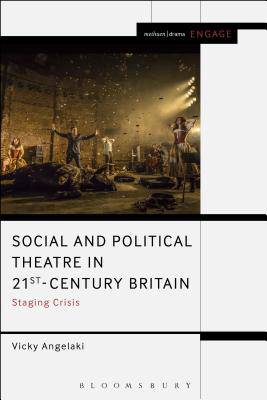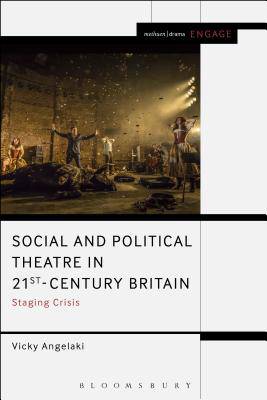
Je cadeautjes zeker op tijd in huis hebben voor de feestdagen? Kom langs in onze winkels en vind het perfecte geschenk!
- Afhalen na 1 uur in een winkel met voorraad
- Gratis thuislevering in België vanaf € 30
- Ruim aanbod met 7 miljoen producten
Je cadeautjes zeker op tijd in huis hebben voor de feestdagen? Kom langs in onze winkels en vind het perfecte geschenk!
- Afhalen na 1 uur in een winkel met voorraad
- Gratis thuislevering in België vanaf € 30
- Ruim aanbod met 7 miljoen producten
Zoeken
€ 36,45
+ 72 punten
Uitvoering
Omschrijving
In a context of financial crisis that has often produced a feeling of identity crisis for the individual, the theatre has provided a unifying forum, treating spectators as citizens. This book critically deals with representative plays and playwrights who have stood out in the UK and internationally in the post-recession era, delivering theatre that in the process of being truthful to the contemporary experience has also redefined theatrical form and content.
Built around a series of case-studies of seminal contemporary plays exploring issues of social and political crisis, the volume is augmented by interviews with UK and international directors, artistic directors and the playwrights whose work is examined. As well as considering UK stage productions, Angelaki analyses European, North American and Australian productions, of post-2000 plays by writers including: Caryl Churchill, Mike Bartlett, Dennis Kelly, Simon Stephens, Martin Crimp, debbie tucker green, Duncan Macmillan, Nick Payne and Lucy Prebble.
At the heart of the analysis and of the plays discussed is an appreciation of what interconnects artists and audiences, enabling the kind of mutual recognition that fosters the feeling of collectivity. As the book argues, this is the state whereby the theatre meets its social imperative by eradicating the distance between stage and spectator and creating a genuinely shared space of ideas and dialogue, taking on topics including the economy, materialism, debt culture, the environment, urban protest, social media and mental health. Social and Political Theatre in 21st-Century Britain demonstrates that such contemporary playwriting invests in and engenders moments of performative reciprocity and spirituality so as to present the audience with a cohesive collective experience.
Built around a series of case-studies of seminal contemporary plays exploring issues of social and political crisis, the volume is augmented by interviews with UK and international directors, artistic directors and the playwrights whose work is examined. As well as considering UK stage productions, Angelaki analyses European, North American and Australian productions, of post-2000 plays by writers including: Caryl Churchill, Mike Bartlett, Dennis Kelly, Simon Stephens, Martin Crimp, debbie tucker green, Duncan Macmillan, Nick Payne and Lucy Prebble.
At the heart of the analysis and of the plays discussed is an appreciation of what interconnects artists and audiences, enabling the kind of mutual recognition that fosters the feeling of collectivity. As the book argues, this is the state whereby the theatre meets its social imperative by eradicating the distance between stage and spectator and creating a genuinely shared space of ideas and dialogue, taking on topics including the economy, materialism, debt culture, the environment, urban protest, social media and mental health. Social and Political Theatre in 21st-Century Britain demonstrates that such contemporary playwriting invests in and engenders moments of performative reciprocity and spirituality so as to present the audience with a cohesive collective experience.
Specificaties
Betrokkenen
- Auteur(s):
- Uitgeverij:
Inhoud
- Aantal bladzijden:
- 280
- Taal:
- Engels
- Reeks:
Eigenschappen
- Productcode (EAN):
- 9781474213165
- Verschijningsdatum:
- 23/02/2017
- Uitvoering:
- Paperback
- Formaat:
- Trade paperback (VS)
- Afmetingen:
- 137 mm x 213 mm
- Gewicht:
- 362 g

Alleen bij Standaard Boekhandel
+ 72 punten op je klantenkaart van Standaard Boekhandel
Beoordelingen
We publiceren alleen reviews die voldoen aan de voorwaarden voor reviews. Bekijk onze voorwaarden voor reviews.









